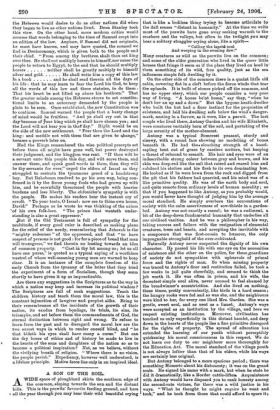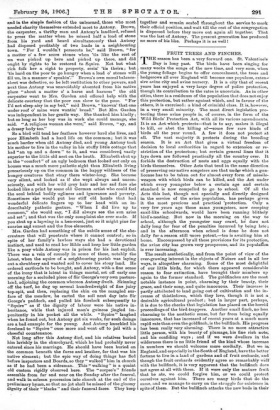A SON OF THE SOIL.
AWIDE space of plonghland skirts the southern edge of the common, sloping towards the sun and the distant bills. This is the peewits' favourite feeding ground, and here all the year through you may hear their wild beautiful crying that is like a bodiless thing trying. to become articulate to the dull senses "distant in humanity." At the time we write most of the peewits have gone away seeking warmth to the seashore and the valleys, but often in the twilight you may hear a solitary straggler crying alone, like a spirit-
" Calling the lapsed soul And weeping in the evening dew."
Many creatures as wild as the peewits live on the common; and some of the older generation who lived in the queer little houses that fringe it seem as if the place they lived on bred in' them something of its wild, free quality, just as the sea influences simple folk dwelling by it. On the other side of the common there is a quaint little old cabin, cowering flat in a cleft before the fierce winds that tear the uplands. It is built of stones picked off the common, and has no upper story, which our people consider a very poor way of living. "A house be'nt home," say they, "when he don't hey an up and a down." But the bygone heath-dweller who built the hut had a finer instinct for the proprieties of existence, and laid his dwelling safe below the wind's danger- mark, nesting in a furrow, as it were, like a peewit. The last couple who lived there, Antony Garden and his wife Elizabeth, were creatures veritably born of the soil, and partaking of the large serenity of the mother-element.
Antony was a typical Somerset peasant, sturdy and sinewy, with a round face showing no modelling of bones beneath it. He had they slouching strength of a hazel- sapling bent out of grace by careless nutters, but keeping a threat of rebound to assault. His hair and eyes were of an indescribable strong colour between grey and brown, and his skin was deep-red like the soil that raised and reared him and subdued his clothes and his flesh to its own dominating hue. He looked as if he were hewn from the rock and digged from the pit that his fathers had quarried, and his mind was of a like primitive quality. He was of the earth body and soul, and quite remote from ordinary levels of human morality; so that if you happened to like Antony, as you probably would, you would iiever have thought of judging him by the average moral standard. He simply overbore the conventions of society with the calm assertiveness of sow-thistle in a garden- bed. Antony was not exactly a rascal; he was a rudiment, a bit of the deep-down fundamental humanity that underlies all our civilised vanities. And he was a philosopher in his way, taking success and failure with the resignation of elemental creatures, trees and beasts, and accepting the inevitable with a composure that was first-cousin to humour, the only impregnable stronghold of the over-cultivated.
Naturally Antony never suspected the dignity of his own character. He passed his life with one eye on the necessities of existence and the other on the police, for these guardians of society do not sympathise with upheavals of primal force and the rights of man. So when missing property was traced to Antony's door and restitution failed, he took a few weeks in jail quite cheerfully, and seemed to think the job worth it. He was often in prison, and his wife, the decentest simple soul alive, never seemed to feel shamed by the breadwinner's eccentricities. And she lived on nothing, these times, pretty conveniently, like birds in a hard season ; the hungry rooks were fed and so was she, and the neighbours were kind to her, for every one liked Airs. Garden. She was a gentle, sweet soul, and as neat as a linnet. Antony's ways were accepted as an institution by the vill.;ge,. and here we respect existing institutions. Moreover, civilisation has touched us only superficially in this distant hamlet, and deep down in the hearts of the people lies a fine primitiare disregard for the rights of property. The spread of education has extended the learning of our youth without perceptibly quickening his moral consciousness in this respect. We do not learn our duty to our neighbour more thoroughly for the Education Act. The moral standard of the village youth is not always loftier than that of his elders, while his ways are certainly less original But Antony belonged to a more spacious period ; there was something Homeric about his dishonesty; it was on the grand scale. He signed his name with a mark, but when he stole he did it dramatically, like a Border cattle-liftea Acquaintance with Antony would have disposed you to rank honesty among the second-rate virtues, for there was a wild justice in his ways. "What he thought he might require he went and took," and he took from those that could afford to spare it;
and in the simple fashion of the unlearned, those who most needed charity themselves extended most to Antony. Brown, the carpenter, a thrifty man and Antony's landlord, refused to press the matter when he missed half a load of stone from his yard and heard simultaneously that Antony had disposed profitably of two loads in a neighbouring town. "For I wouldn't persecute he," said Brown, "for a matter o' a few score stones when 'tis like the rest of un was picked up here and picked up there, and did ought by rights to be restored to Squire. Not but what rich folk hey a right to property, seem' tis theirn ; but 'tis hard on the poor to go hungry when a load o' stones will 611 un, in a manner o' speakin'." Brown's own moral balance- sheet was defective, so he left restitution to other powers, and next time Antony was unavoidably absented from his native place "about a matter o' a harse and harness" the old carpenter went to Mrs. Garden and offered help with the delicate courtesy that the poor can show to the poor. "For I'd not sleep aisy in my bed," said Brown, " knowm' that one under roof o' mine were wantin' bread." But Mrs. Garden was independent in her gentle way. She thanked him kindly; but so long as her boy was in work she could manage, she said. "A religious woman she were," said Brown, "ay, and a dressy body too."
So a bird will tend her feathers however hard she lives, and poor Elizabeth had a hard life on the common; but it was much harder when old Antony died, and young Antony took his mother to live in the valley in his stuffy little cottage that had "an up and a down" to it, and was considered vastly superior to the little old nest on the heath. Elizabeth shut up in the "comfort" of an ugly bedroom that looked out only on houses was a much more pathetic sight than Elizabeth living precariously up on the common in the happy wildness of the hungry creatures that stray there winter-long. She became very silent, and looked as if she wept always and uncon- sciously, and with her wild grey hair and her sad face she looked like a print by some old German artist who could feel the soul behind bodily ugliness and ignorance and poverty. Sometimes se would put her stiff old hair& that had wonderful delicate fingers up to her head with an in- describably pathetic gesture. "When I did live up to common," she would say, "I did always see the sun arise and set"; and that was the only complaint she ever made. If you shut up a lapwing in a hen-roost, just so it might pine for sunrise and 8111:met and the free elements. Mrs. Garden had something of the subtle sense of the she- creature that will penetrate where it cannot control ; so in spite of her family's lawless ways she had a devotional instinct, and used to read her Bible and keep her little garden like a posy while Antony was in prison for his last exploit. There was a vein of comedy in some of these, notably the latest, when the squire of a neighbouring parish was laying out a shrubbery and wanted soil to cover his stony land. He ordered cartloads to be bought, and Antony, with a fine sense of the irony that is latent in things mortal, set off early one morning for a secluded piece of Sir George's very own pasture- land, adjoining the common whereon Antony dwelt. Skinning off the turf, he dug up several hundredweight of fine juicy top-spit, and then, replacing the skin on the mangled sur- face of the meadow, he carted the soil next day into Sir George's paddock, and pulled his forelock subsequently to "Squire" as if the dignity of labour were his native in- heritance, while that injured man's guineas jingled im- penitently in his pocket all the while. " Squire " laughed when he found out, but Antony got six weeks, for such doings are a bad example for the young. And Antony knuckled his forehead to "Squire" once more and went off to jail with a cheerful countenance.
Not long after this Antony died, and his relatives buried him lavishly in the churchyard, which he had probably never entered since his marriage. He should have been buried on the common beneath the furze and heather, for that was his native element; but the epic way of doing things has fled before inspectors and Boards, so they "walked" him in church as if he had been a sidesman. _ This "walking" is a quaint old custom rigidly observed here. The "corpse's" friends assemble from far and near on the Sunday after the funeral, and walk in solemn procession into church at the end of the preliminary hymn, so that no jot shall be missed of the gloomy dignity of their " blacks " and their funeral faces. They keep together and remain seated throughout the service to mark their official position, and wait till the rest of the congregation is dispersed before they move out again all together. That was the last of Antony. The present generation has produced no more of his like. Perhaps it is as well!











































 Previous page
Previous page